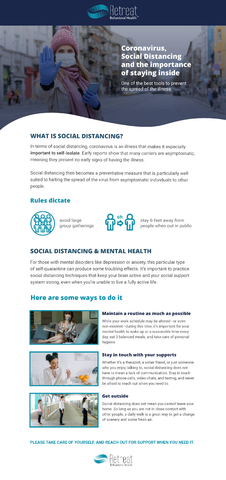Coronavirus, Social Distancing and the Importance of Staying Inside

When it comes to minimizing the effects of coronavirus, social distancing is one of the best tools we have to prevent the spread of the illness. However, isolation of this sort can take a major toll on mental health, especially if you live alone or have suffered, or currently suffer, from mental disorders. In this post, we’ll go over the basics of this self-isolation tactic, with a focus on how to social distance when struggling with a mental health disorder.
What is Social Distancing?
Social distancing & pandemic responses go hand in hand. By isolating ourselves in our homes and away from other  people, we slow down the rate of transmission of a contagious illness. We can also stop it from reaching certain people entirely. Current rules dictate avoiding large group gatherings and staying at least six feet away from other people when out in public.
people, we slow down the rate of transmission of a contagious illness. We can also stop it from reaching certain people entirely. Current rules dictate avoiding large group gatherings and staying at least six feet away from other people when out in public.
In terms of social distancing, coronavirus is an illness that makes it especially important to self-isolate. Early reports show that many carriers are asymptomatic, meaning they present no early signs of having the illness. Social distancing then becomes a preventative measure that is particularly well suited to halting the spread of the virus from asymptomatic individuals to other people.
Social Distancing & Mental Health
For those with mental disorders like depression or anxiety, this particular type of self-quarantine can produce some troubling effects. Feelings of loneliness and isolation can onset rapidly in this situation, in turn leading to added stress and sadness. Even boredom can be a trigger when it comes to managing your mental health.
It’s important to practice social distancing techniques that keep your brain active and your social support system strong, even when you’re unable to live a fully active life. Here are some ways to do it:
Maintain a routine as much as possible. While your work schedule may be altered—or even non-existent—during this time, it’s important for your mental health to wake up at a reasonable time every day, eat three balanced meals, and take care of personal hygiene.
Stay in touch with your supports. Whether it’s a therapist, a sober friend, or just someone who you enjoy talking to, social distancing does not have to mean a lack of communication. Stay in touch through phone calls, video chats, and texting, and never be afraid to reach out when you need to.
Get outside. Social distancing does not mean you cannot leave your home. So long as you are not in close contact with other people, a daily walk is a great way to get a change of scenery and some fresh air—both of which are very important.
Social distancing is important right now and has the possibility to change the outcome of the virus. The more preventative measures we take now, the better we can fight the spread of the virus and return to normal life. Please take care of yourself, and reach out for support when you need it.



